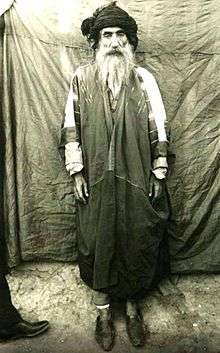Alevi Zaza
The Alevi Zaza or Zaza Alevis is the community of Zazas adhering to Alevism, the other group of Zazas adhering to Sunni Islam (the Sunni Zaza), roughly divided by half.[1] The Zazas are sometimes regarded a sub-group of Kurds;[2] the Zaza language is part of the Western Iranian languages, though it is not mutually intelligible with the Kurdish language.[3] There is a history of antagonism between the two Zaza religious groups, taken advantage of by the Turkish government.[4] The Alevi Zaza are concentrated in the region of Dersim. There are also Kurmanj-speaking (Kurds) and Turkish-speaking Alevis in Eastern Turkey. The term "Kurdish Alevis" is used to include both Kurmanj-speakers and Zaza-speakers.[5] The community is generally supportive of the Turkish state.
The Alevi Zaza in Dersim call themselves Kırmanc, while they call the Sunni Zaza Zaza, and Kurdish-speakers as Kurmanc and Kurdish language as Kırdaski.[6] In the Zaza language in Dersim, Kırmanc is a synonym for Alevi.[6] To some Alevi Zaza, the term Kurd means "Sunni".[7] They also call themselves Dersimli, increasingly popular.[8]
Some Alevi Zaza joined the 1921 Koçgiri rebellion, however, many tribal chiefs were loyal Kemalists. The Alevi Zaza did not support the 1925 rebellion led by the Sunni Zaza widely supported by other Kurdish groups.[4] Sunni Zaza elders claim the rebellion was suppressed by the government using Alevi Zaza help.[4] In 1937, the Alevi Zaza rose up against the government, in the event known as the "Dersim rebellion", which was suppressed by the government using Sunni Zaza help.[4] This has marked the Zaza society.[4] After the outbreak of armed struggle of the Kurdistan Workers' Party (PKK) in the 1984, the Sunni–Alevi Zaza antagonism has been reduced.[9] Much of the Sunni Zaza and Alevi Zaza communities view the PKK as their only protection.[9] A separate, Zaza nationalism, is supported mainly by Alevi Zaza, unlike the Sunni Zaza.[10]
Notable people

- Seyid Riza (1863–1937), tribal leader, led the Dersim rebellion.
- Hüseyin Aygün (born 1970), Turkish lawyer and politician
- Kamer Genç (1940–2016), Turkish politician
- Sakine Cansız (1958–2013), Turkish Kurdish activist, co-founder of PKK.[11]
- Ferhat Tunç (born 1964), Turkish musician
References
- ↑ Kaya 2011, p. 147.
- ↑ Paul J. White (2000). Primitive Rebels Or Revolutionary Modernizers?: The Kurdish National Movement in Turkey. Zed Books. pp. 48–. ISBN 978-1-85649-822-7.
- ↑ White & Jongerden 2003, p. 115.
- 1 2 3 4 5 Kaya 2011, p. 148.
- ↑ Krisztina Kehl-Bodrogi; Barbara Kellner Heinkele; Anke Otter Beaujean (1997). Syncretistic Religious Communities in the Near East: Collected Papers Od the International Symposium "Alevism in Turkey and Comparable Syncretistic Religious Communities in the Near East in the Past and Present" Berlin, 14-17 April 1955. BRILL. pp. 2–. ISBN 90-04-10861-0.
- 1 2 Issa 2016, p. 66.
- ↑ Dale F. Eickelman (1998). The Middle East and Central Asia: An Anthropological Approach. Prentice Hall. p. 271. ISBN 978-0-13-123019-4.
- ↑ Marii͡a Nikolaeva Todorova (2004). Balkan Identities: Nation and Memory. C. Hurst & Co. Publishers. pp. 65–. ISBN 978-1-85065-715-6.
- 1 2 Kaya 2011, p. 149.
- ↑ Asian and African Studies. 16. Vydavatel̕stvo Slovenskej akadémie vied. 2007. p. 18.
Zaza nationalism is supported mainly by Alevi Zazas, while Sunni Zazas keep their reservations. And what's more, for some Zaza Alevis, Kurd even means 'Sunni'.
- ↑ "Slain Kurdish activist Cansiz leaves stamp on militant PKK". Reuters. 11 January 2013. Retrieved 11 January 2013.
Sources
- Mehmed S. Kaya (15 June 2011). The Zaza Kurds of Turkey: A Middle Eastern Minority in a Globalised Society. I.B.Tauris. pp. 148–. ISBN 978-1-84511-875-4.
- Tözün Issa (22 July 2016). Alevis in Europe: Voices of Migration, Culture and Identity. Taylor & Francis. pp. 85–. ISBN 978-1-317-18264-1.
- Paul Joseph White; Joost Jongerden (2003). Turkey's Alevi Enigma: A Comprehensive Overview. BRILL. pp. 115–. ISBN 90-04-12538-8.
- Elise Massicard (2013). The Alevis in Turkey and Europe: Identity and Managing Territorial Diversity. Routledge. pp. 24–. ISBN 978-0-415-66796-8.